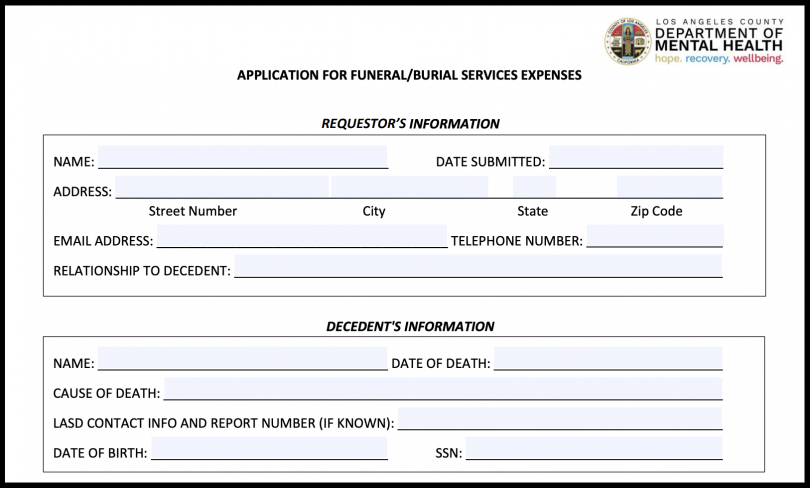On Tuesday, April 19, the Los Angeles County Board of Supervisors voted unanimously to continue operating and funding a program meant to provide compassionate support to people whose loved ones died in jail or during violent encounters with deputies on patrol.
In July 2018, the civilian commission overseeing the Los Angeles County Sheriff’s Department (LASD) initiated an investigation into reports from local families that members of the sheriff’s department failed to provide timely notification of deaths in custody, and were insensitive to those grieving such deaths.
A year later, the LA County Board of Supervisors voted to launch a pilot program — the Family Assistance Program — to address these issues.
The program ran on a one-time infusion of funding that, because of delays, stretched beyond the initial plan of one year.
Through the program, liaisons from the Department of Mental Health were supposed to ensure grieving families received timely information in the wake of a death, were able to access counseling and other services, and were able to access financial assistance for burials.
In February 2022, the county’s Office of the Inspector General (OIG) issued a report assessing the implementation of the pilot program.
The report showed that the Family Assistance Program was able to provide help to 45 families.
Twenty-one of those families received connections from the Department of Mental Health to community organizations and mental health services, and 24 others received financial assistance with burial expenses — up to $7,500. These two groups made up 40 percent of all families eligible for assistance.
Still, the program, and the county’s overall effort to improve treatment of families, experienced setbacks.
Challenges remain
Facilitators reportedly struggled to boost awareness of the program. For this and other reasons, it often took longer than intended to disburse funding set aside for funerals and other support to the families. (Read more about the OIG report’s findings in WitnessLA’s previous story.)
Meanwhile, families continued to report delays in receiving information from the sheriff’s department.
The relatives of one incarcerated mother, Destiny Ortega, said they found out she had died in jail after it was reported on the news and social media a week later.
And, at COC and LA County Board of Supervisors meetings, people who had sued the LASD for wrongful death and publicly criticized the department reported frightening and insensitive treatment. Deputies, they said, were following them home, pulling them over and detaining them unnecessarily, driving by memorial sites and making mocking faces and rude hand gestures, and otherwise harassing them.
Among this group were the family members of 18-year-old Paul Rea, 21-year-old Anthony Vargas, and 24-year-old Ryan Twyman. The board of supervisors addressed the issue of harassment separately.
During Tuesday’s board meeting, Supervisor Hilda Solis, who penned the motion with Supervisor Holly Mitchell, described a past listening session with the impacted community members.
“I heard their voices, the exhaustion, the frustration, but also the courage to keep moving forward, seeking justice for their loved ones who were tragically taken away [by] the sheriff’s department,” she said. “It has taken time, but this permanent program is for you, the families, and our community. The program is in memory of your loved ones.”
At the same time, said Solis, “we’ll continue to demand accountability and transparency through the support of our Office of Inspector General and the sheriff Civilian Oversight Commission to resolve systemic instances of deputy misconduct.”
an LA County resident, Julie Martinez, urged the board to pass the Family Assistance Plan motion, to continue providing support for families impacted by violence. That trauma is compounded, she said, when families are harassed “while they are speaking out against sheriff overreach and sheriff violence.”
Next steps
Despite its flaws, Inspector General Max Huntsman, in his report, said the program should continue — with improvements and with more funding.
In October 2021, the county supervisors directed the CEO to find bridge funding to make sure that money continues to be available for burials until the program and its funding might be made permanent.
A recommended annual budget for the program, developed by the Office of Violence Prevention, called for $1.5 million between personnel and operating expenses, within which $375,000 would go toward burials, and $350,000 would go to community based partners providing things like mental health care, grief counseling, peer support, and assistance with vigils.
On April 19, the board of supervisors voted 5-0 to direct the county’s CEO to find and allocate that ongoing funding request of $1.5 million from the Office of Violence Prevention. The motion also directed the relevant county departments to implement the recommendations in Huntsman’s report, including the recommendation that the Department of Mental Health family liaisons or staff from the medical examiner-coroner’s office be the ones to notify next-of-kin after an in-custody death, rather than the sheriff’s department.
The county’s proposed schedule would see the restructured program launched over the summer of 2022.
The motion came as the county CEO presented the first iteration of a proposed budget for fiscal year 2022-23. (We’ll have more on the justice-related parts of the budget proposal later this week.)

